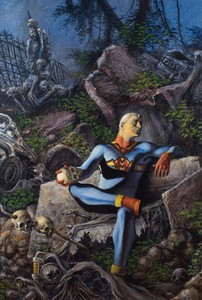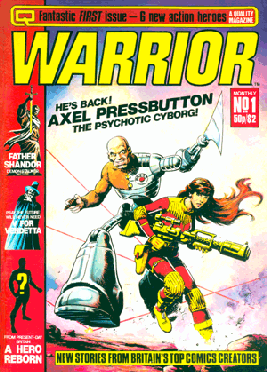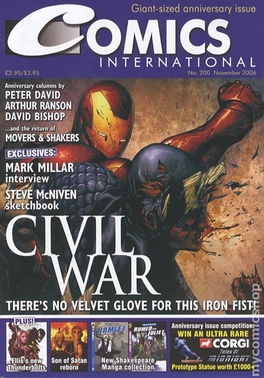
Miracleman, whose civilian name is Michael "Mike" Moran, is a British Golden Age comic book superhero appearing in comic books first published by L. Miller & Son, Ltd. Created by Mick Anglo, the character first appeared in Marvelman #25. The character was subsequently revived in 1982 by Alan Moore and Garry Leach as the lead of Marvelman in the pages of Warrior. After that publication was cancelled, the revival was continued as Miracleman by Eclipse Comics in 1985, with the character renamed accordingly, but went out of print following the company's demise in 1994.

A British comic is a periodical published in the United Kingdom that contains comic strips. It is generally referred to as a comic or a comic magazine, and historically as a comic paper. As of 2014, the three longest-running comics of all time were all British.

Warrior was a British comics anthology that ran for 26 issues between March 1982 and January 1985. It was edited by Dez Skinn and published by his company Quality Communications. It featured early work by numerous figures who would go on to successful careers in the industry, including Alan Moore, Alan Davis, David Lloyd, Steve Dillon, and Grant Morrison; it also included contributions by the likes of Brian Bolland and John Bolton, while many of the magazine's painted covers were by Mick Austin.

Marvel UK was an imprint of Marvel Comics formed in 1972 to reprint US-produced stories for the British weekly comic market. Marvel UK later produced original material by British creators such as Alan Moore, John Wagner, Dave Gibbons, Steve Dillon, and Grant Morrison.

Derek Graham "Dez" Skinn is a British comic and magazine editor, and author of a number of books on comics. As head of Marvel Comics' operations in England in the late 1970s, Skinn reformatted existing titles, launched new ones, and acquired the BBC license for Doctor Who Weekly. After leaving Marvel UK, Skinn founded and edited Warrior, which featured key works by Alan Moore.
Garry Leach was a British comics artist and publisher.

Axel Pressbutton is a fictional character appearing in comic books. A violent cyborg with the face of Ernest Borgnine, a button on his chest which delivers orgasmic pleasure when pressed, and a phobia about vegetation, he was created by Steve Moore and Alan Moore, under the pseudonym "Curt Vile".
Michael Anglo was a British comic book writer, editor and artist, as well as an author. He was best known for creating the superhero Marvelman, later known as Miracleman.

Comics International was a British news and reviews magazine about comic books. Founded in 1990, it was published monthly by Quality Communications until 2006, and then by Cosmic Publications Ltd. until 2010.

Neat Stuff is an American alternative comic book series created by Peter Bagge and published by Fantagraphics. It ran from 1985 to 1989 for fifteen issues. Most takes the form of a series of short stories featuring different sets of characters, although some issues feature full-length stories relating to just one set of characters. The series was Bagge's first one-man comics anthology. Described by Dez Skinn in Comix: The Underground Revolution as the work which "threw Peter Bagge into the limelight", Bagge soon retired the title in preference of continuing the Bradley characters' story in Hate.
Paul Neary was a British comic book artist, writer and editor.

The Liberators was a science fiction comic book story based on concepts created by Dez Skinn and Will Simpson for the British anthology title Warrior. It was among the first mainstream comic strips written by Grant Morrison.

Young Marvelman was a British Golden Age superhero comic book, published by L. Miller & Son in the United Kingdom between 1954 and 1963. The lead character was originally created in 1954 by Mick Anglo as a replacement for Captain Marvel Jr due to Fawcett Publications ending the latter's titles following legal action by DC Comics.

Miracleman is a superhero comic book series, centred on the character of the same name. Originally created by Mick Anglo and published by L. Miller & Son, Ltd. as Marvelman between 1954 and 1963, the character was revived in 1982 for a revisionist story written by Alan Moore, beginning in the pages of British anthology Warrior. From 1985 the character was renamed Miracleman, and the series was continued by American publisher Eclipse Comics until 1993. Since 2009 the rights to the character have been licensed by Marvel Comics, who have published new material.
The House of Hammer was a British black-and-white magazine featuring articles and comics related to the Hammer Film Productions series of horror and science fiction films. The brainchild of Dez Skinn, almost every issue of the magazine featured a comics adaptations of a Hammer film, as well as an original comics backup story, such as the long-running feature Van Helsing's Terror Tales.

Thorpe & Porter was a British publisher, importer, and distributor of magazines and comic books. At first, the company was known for repackaging American comics and pulp magazines for the UK market. Later on, it became a publisher of original material. The company released more than 160 comics titles in the UK, the most prominent being Classics Illustrated, MAD UK, Edgar Rice Burroughs' Tarzan of the Apes, Larry Harmon's Laurel & Hardy, House of Hammer, and Forbidden Worlds. T & P's most prominent imprints were Top Sellers Ltd. and Brown Watson. Thorpe & Porter operated from 1946 to c. 1979.

Marvelman was a British Golden Age superhero comic book, published by L. Miller & Son in the United Kingdom between 1954 and 1963. The lead character was originally created by Mick Anglo as a replacement for Captain Marvel due to Fawcett Publications ending the latter's titles following legal action by DC Comics.
Williams Publishing was the short-lived European comics and magazines publishing division of Warner Communications in the 1970s. Headquartered at the Columbia-Warner House in London, Williams had European-language divisions in Denmark, Finland, France, Italy, the Netherlands, Norway, Sweden, and West Germany. Comics titles were for the most part translations of American publications — many of them Warner properties — as well as some U.K. and European titles. Initiated in 1971, most of the Williams publishing divisions were closed or sold off in the period 1974–1979.

Marvelman Family was a British Silver Age superhero comic book, featuring eponymous team consisting of the characters Marvelman, Young Marvelman and Kid Marvelman. The title was created in 1956 by Mick Anglo for publisher L. Miller & Son as a companion title for the company's Marvelman and Young Marvelman magazines.
The ownership of the comic book character Marvelman was the subject of several legal disputes, both before and after the character was renamed Miracleman in 1985. The character and its derivatives were created by Mick Anglo in 1954 at the request of the publisher Len Miller. Unlike many comic book creators from the period, Anglo retained copyright of the character. Following Anglo's death in 2011, ownership is held by Mick Anglo's estate.














